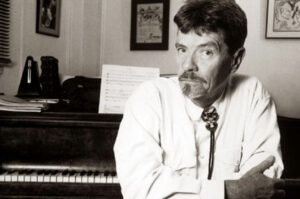Pauline Oliveros and James Tenney
 A few days up at the Charles Ives Center for the Performing Arts gives me relief. I am in residence with musician, composer, and maverick Pauline Oliveros. “Hear, remember, and imagine,” she intones. You hear a sound, remember it, and then imagine it again. She uses words to form her music, bringing the performers into the process of creation. Her work begets community.
A few days up at the Charles Ives Center for the Performing Arts gives me relief. I am in residence with musician, composer, and maverick Pauline Oliveros. “Hear, remember, and imagine,” she intones. You hear a sound, remember it, and then imagine it again. She uses words to form her music, bringing the performers into the process of creation. Her work begets community.
I am struck by music’s linear process, where duration is the great ingredient. Unlike visual art, music cannot be experienced all at once. Instead, it moves though time. As we listen, we construct the whole in our mind through memory. Like a transparent ghost, music moves our hearts with its lack of tangible substance.
∗∗∗∗
I heard a piece by composer Jim Tenney recently at a concert. Something interests me. His piece is a voyage of technical manipulations involving tape delay and difference tones – those haunting resonances that appear when certain pitches rub against each other.
piece is a voyage of technical manipulations involving tape delay and difference tones – those haunting resonances that appear when certain pitches rub against each other.
At first I am rapt. But, I cannot hold on, my mind disengages and falls into a dark quiet. After eight to ten minutes, the piece suddenly opens up, and I catch onto the piece again. How did I get here – where have I been? As if a white shirt, shown in meticulous technical detail, suddenly blossoms with blood, both a terrifying signal of death, and an affirmation of life.
The shape of his music reminds me of my own shape. While the content of our work is different, the linear shape and flow, moving from one point to (and through) another, is similar. He uses a one-theme-one-idea approach, where the starkness and persistence engages the listener. I am episodic, darting though material with single-minded purpose. His music is a straight line, mine moves in and over. He takes a fragment and expands it. I sew my fragments together, so one becomes another becomes one. His overall shape is like the stem of a flower, long and thin with a sudden bloom at the end. My shape is conical; the whole piece expands from a beginning point and opens up to an ecstasy. His epiphany is sharply beautiful in relief to his material. Mine is joyous and circular.
Excerpted from Let Your Heart Be Broken, Life and Music from a Classical Composer by Tina Davidson. © Tina Davidson, 2022
Listen: Wēpan for string quartet and piano, was written at the request of the Open End Ensemble. From the old English, wēpan means to weep, bewail, mourn over, or deplore.
I have written about Pauline Oliveros (1932-2016) before and I suspect I will write about her again. She is one of the great American composers, investigating new ways to focus attention on music including her concepts of “deep listening” and “sonic awareness.”
Jim Tenney (1935-2006), a pioneer of computer music, was interested in the possibilities offered by pure tuning. I met him in the mid-1980s and was drawn to him as a fellow graduate from Bennington College, and to his warmth, kindness and curiosity.
